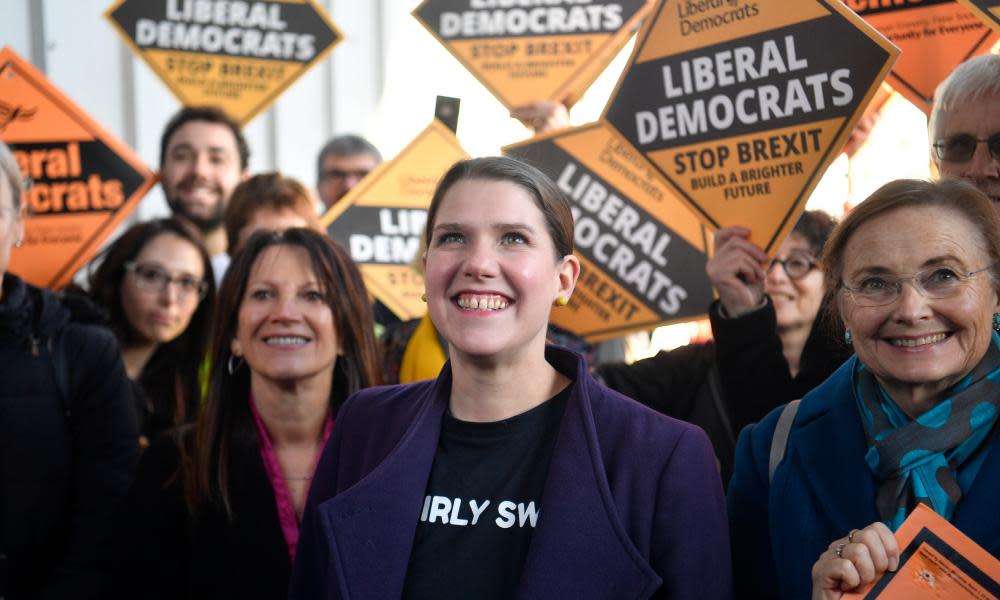Jo Swinson denies losing control over Lib Dem party

Jo Swinson has sought to quell a mini-rebellion in the Liberal Democrats about whether to stand in highly marginal seats held by Labour over the Conservatives, insisting the party must give voters a genuine remain option in the election.
It comes after the party’s candidate in Canterbury, Tim Walker, stood down saying he did not want to risk helping replace the remain-minded Labour MP, Rosie Duffield, who has a majority of 187, with a strongly pro-Brexit Tory candidate.
The Lib Dems have already replaced Walker and threatened him with disciplinary action. This prompted another candidate, Guy Kiddey in High Peak, to say he would step down if the disciplinary threat was not lifted from the “noble” Walker.
Kiddey later tweeted he had been told he would be replaced as the candidate, adding: “They might have told me directly rather than leave it to unsuspecting journalists to break the news.”
A party statement said: “Guy Kiddey is not our candidate for the High Peak. The local party will be announcing their candidate soon.”
During a campaign visit in north London on Wednesday, Swinson denied she was losing control. “No,” she said. “We have a healthy debate within the party and some candidates have made their own decisions.”
Speaking separately to Channel 4 News, Swinson stressed that the Lib Dems had stood aside as part of the so-called remain alliance with Plaid Cymru and the Greens, and for pro-remain former Conservatives such as Dominic Grieve and Anna Soubry.
Labour “have been absent from all of that”, the Lib Dem leader said, and were not a party of remain. “We want to make sure that people have the chance to stop Brexit,” she added.
The dispute, and the way it has been handled, has nonetheless enraged some Lib Dem activists.
On Wednesday the party installed an outside candidate in Canterbury to replace Walker, after other local activists made it plain they would not replace him. Instead, Claire Malcolmson, a councillor in Dorking, Surrey, is being prepared to run in the seat.
Kiddey, whose marginal Derbyshire constituency is held by Labour’s Ruth George with a majority of just over 2,322 from the Conservatives, said he wanted to show solidarity with Walker.
The former Economist journalist said if he campaigned hard in High Peak he would split the vote and the Conservative candidate would win.
However, the Lib Dems insisted the party would stand in the constituency. A party spokeswoman said: “The Labour party have failed to oppose Brexit. The Liberal Democrats will not be standing down for any party that is pursuing Brexit. We will be fielding a candidate in High Peak, giving voters the opportunity to stop Brexit and build a brighter future.”
Kiddey said he had been appalled to receive an email on Tuesday night from James Gurling, the chairman of the Lib Dem election campaign, who wrote to inform candidates that “disciplinary action” had been instigated against Walker.
“I was, and am, appalled at this response,” Kiddey said in a statement. “So is my now former election agent, who has resigned from the Lib Dems. This means that I am, in the absence of a replacement, not legally able to stand as a candidate in High Peak in the coming election, as I do not wish to be my own agent.
“I will not seek this replacement unless the party retracts its implicit threat to candidates, drops its intended disciplinary proceedings against Mr Walker, and apologises unreservedly. I doubt it will, in which case I too will stand down and resign my membership tomorrow [Thursday], and I will vote Labour.”
Marginal seats are parliamentary constituencies that have had a history of changing hands between parties, or in which the incumbent MP has a very small majority. Eleven seats were won by fewer than 100 votes in 2017. Often parties will target marginal seats with extra campaigning resources, as they are the places where they feel they are most likely to affect the balance in the House of Commons.
There are several seats, including Kensington, Dudley North, Southampton Itchen and Newcastle-Under-Lyme, where the 2017 margin between the Conservatives or Labour winning the seat was between 20 and 30 votes. The most marginal seat in the country, though, is North East Fife, held by the SNP over the Liberal Democrats by just two votes.
A three-way marginal, where the vote has recently been close between three parties, is much rarer.
Kiddey said that there were many other Lib Dem candidates standing in marginal seats who felt the same as he did. “We are all as torn as Tim Walker, but none of us is as noble,” he said. “I’ve never met Mr Walker but, as a distant colleague, I stand by him and his decision to stand down.”
His statement continued: “Even though the Lib Dems now plan to field a candidate to replace Mr Walker, I hope the good people of Canterbury have noted the spirit of his gesture and will honour its intentions.”
He also criticised Swinson for her bullish leadership style. “I have spent much time apologising for it on the rainy doorsteps of High Peak, and it seems to have spread through the ranks of the party leadership,” he wrote.
On Wednesday, Kiddey forwarded to the Guardian messages he claimed to have been sent overnight from High Peak Lib Dems. One read: “Completely support your statement. It’s a really difficult time at the moment and disciplining people for standing up for what they believe in is very disturbing. I think you have achieved a lot anyway given how invisible the Lib Dems were at the last election.”

 Yahoo News
Yahoo News 
